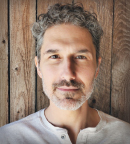
Ethan Zohn
I’m 50, just a year older than my father was when he died of colorectal cancer. I was 14 when my dad died, so to me, cancer has always been synonymous with death. From a young age, my brothers and I had a goal: to make sure we packed in enough life before age 50. It never occurred to us that death could come for us sooner.
I was 35 when I was told that I had CD20-positive Hodgkin lymphoma. My oncologist assured me that although the disease was rare, it was treatable—and even curable. With the memory of my dying father never far from me, I was completely motivated to do whatever it took to beat this cancer. I had the support of family and friends as well as an unshakable confidence in my medical team to get me to the other side of cancer. I had no idea at the time how difficult it would be to get to that other side.
Keeping a Positive Outlook
My first-line treatment was a grueling regimen of rituximab, cyclophosphamide, doxorubicin, vincristine, and prednisone (R-CHOP). When my cancer failed to respond to that treatment, we went to plan B: an even more intensive chemotherapy combination of ifosfamide, carboplatin, and etoposide (ICE), but my cancer failed to respond to that, too. Now, I was beginning to worry. Again, I was reassured by my medical team that the cancer could be halted.
I underwent radiation therapy to, hopefully, kill off enough cancer cells to get me to an autologous stem cell transplant, which I had high hopes would finally be the therapy to cure me of Hodgkin lymphoma. During this time, I tried to keep a positive outlook, but the previous failed treatment attempts had me in a panic—a space I was in often during the years it took to finally get to remission (and cure).
Getting to Cure
Although the transplant was initially successful, I relapsed 20 months later. Early research was showing that a drug called SGN-35, now known as brentuximab vedotin, induced durable objective responses and tumor regression in patients with relapsed or refractory CD30-positive lymphomas.1 My oncologist said the drug might be effective in reducing enough of the cancer cells in my body so I could undergo an allogeneic stem cell transplant. Even though brentuximab vedotin was used as a bridge to transplant, I believe it helped save my life.
My brother, Lee, was a donor match for the transplant, which finally gave me the durable remission I had been hoping for since my diagnosis. He literally gave me back my life.
I’ve now been cancer-free for 12 years, and I don’t take any one of those 4,380 days for granted.
Overcoming Fear
During those years of active disease and intermittent remission, I struggled with so much fear and anxiety that it was difficult to leave my house. I was a young adult totally consumed with “what if” scenarios: What if I don’t get married and can’t have kids? What if I’m unable to get health and life insurance? If I do get married and have kids, will I be able to support my family? What if the cancer finally overwhelms my body and I die?
To get relief, I tapped into all forms of support and complementary therapies I could find. I started practicing meditation; joined First Descents (https://firstdescents.org), an outdoor adventure program for young adults impacted by cancer; and went on a healing journey in Bali. I used medical cannabis to get relief from the multitude of side effects from my treatment and quiet the fear. I also traveled to every major cancer center seeking opinions on my best treatment options.
Because I had a pretty high public profile before my diagnosis, including winning $1 million on the TV reality show Survivor Africa, I decided not to keep my illness a secret and to use my megaphone to help other cancer survivors, especially young adults, struggling with the disease. I’m privileged to be named Global Ambassador for the Leukemia & Lymphoma Society and for AKTIV Against Cancer, which works to ensure that physical exercise is an integral part of cancer treatment.
Soon after my diagnosis, in 2010, I captained and spearheaded the Stand Up To Cancer Reality Team Challenge and helped raise more than $100 million for cancer research.
After my second transplant, I was honored to meet with some of the researchers who had developed brentuximab vedotin, the drug I credit with helping save my life, and thanked them for their dedication and extraordinary work. Supporting research efforts and helping patients with cancer get the care they need has been a blessing and has changed my life.
Giving Back
Early in my life, I got a good understanding of what is important: caring for loved ones and helping others in need. I intend to continue to use my voice and philanthropy to give back to the cancer community that has given me back my life.
REFERENCE
1. Younes A, Bartlett NL, Leonard JP, et al: Brentuximab vedotin (SGN-35) for relapsed CD30-positive lymphomas. N Engl J Med 363:1812-1821, 2010.
Mr. Zohn, 50, divides his time between New Hampshire and Florida. In addition to his philanthropic work, he is cofounder of Grassroot Soccer, an adolescent health organization that leverages the power of soccer to equip young people with services and mentorship to live healthier lives.
Editor’s Note: Columns in the Patient’s Corner are based solely on information The ASCO Post received from patients and should be considered anecdotal.

